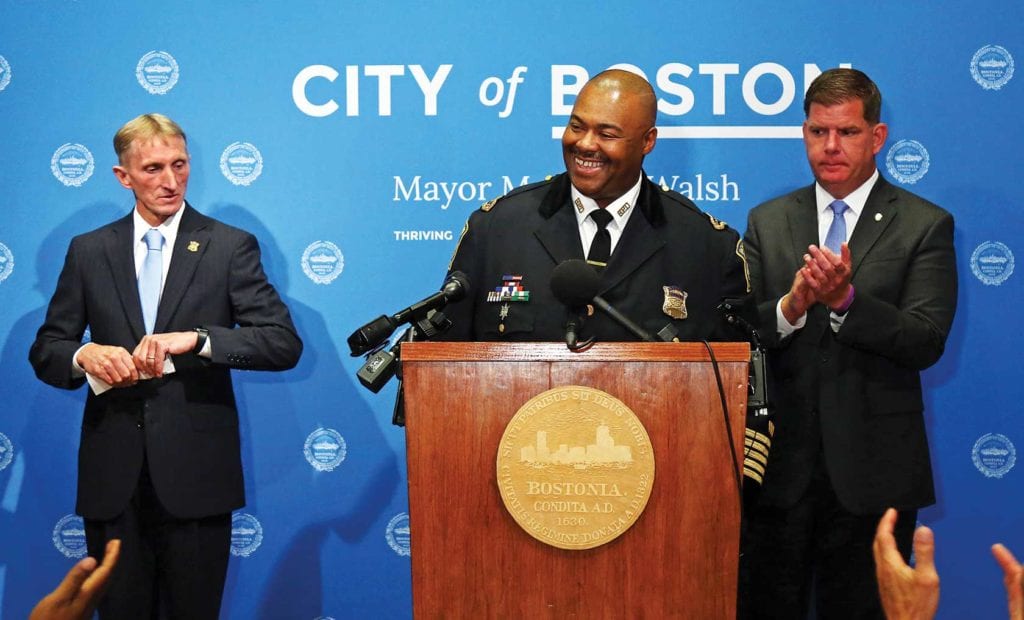Mayor appoints Boston’s first black police commissioner
Activists are hopeful veteran officer will bring change

William Gross is set to become Boston’s first African American police commissioner, intensifying activists’ demands for discrimination within the department and public safety to become his top priorities.
In a press conference on Monday at City Hall, Mayor Martin J. Walsh announced that Commissioner William B. Evans will retire from the Boston Police Department on Aug. 4, after 38 years of service, four of those as commissioner. Gross, currently superintendent-in-chief, will serve as interim commissioner from Aug. 5 until he is formally sworn in.
“I am proud to appoint him as the first African American police commissioner for the City of Boston,” said the mayor, who called Gross a “trusted & respected officer, and member of the community,” in a tweet later that day.
Gross started his career in 1985, patrolling areas of East Boston, Dorchester, South Boston and Charlestown, working in the gang and drug control units before rising through the ranks to become sergeant in 2004, deputy superintendent in 2008 and the city’s first black superintendent-in-chief in 2014.
“It has been my life’s work to serve the community that shaped me and keep people safe in every neighborhood,” said Gross in a statement released by the mayor’s office. In the statement, Gross expressed gratitude to Walsh, Commissioner Evans and the community for his appointment.
Gross will have little time to enjoy the moment’s historical significance before taking charge of 2,200 sworn officers and managing the damning criticisms currently faced by the department.
One complaint that Sophia Hall, an attorney with the Lawyers’ Committee for Civil Rights and Economic Justice, would like Gross to address immediately, is the lack of diversity across the force.
“This is an opportunity for change,” said Hall, “but if the only thing that changes is the color and name of the person at the top, then it will make very little difference.”
Hall hopes Gross will begin to reform the department’s current standards and procedures for recruiting, hiring, retaining and promoting people of color, which, she said, are often discriminatory.
The controversial hair test, for example, used to screen officers for drug use, is just one such procedure that the Lawyers’ Committee, along with the Massachusetts Association of Minority Law Enforcement Officers, have battled against in the courts for more than 14 years. In their clients’ defense, they argue that the test, which replaces a urine test, is discriminatory because the texture of black officers’ hair increases the likelihood that environmental contamination could result in a false positive result.
Through her work, Hall has also seen officers of color bypassed for promotion, according to standards she said are arbitrarily enforced and seem only to apply to candidates of color. Prior misdemeanors for which no charges were brought are often used against people of color seeking police jobs while whites with similar offenses are hired.
Larry Ellison, president of the Massachusetts Association of Minority Law Enforcement Officers, said he would like Gross to address diversity issues, and hopes to build a better working relationship between the nonprofit MAMLEO and BPD leadership.
“We have a lot of work to do,” said Ellison, who hopes at least to open a dialogue with Gross.
The superintendent’s appointment is a change Ellison has been waiting a long time for. He is quick to point out that the BPD’s first African American sergeant, Horatio Homer, was appointed more than a century ago.
“At those rates, we can’t wait another 100 years,” said Ellison.
Public safety is another key area on which Gross will be expected make a significant impact.
“We will be looking to him to help increase public safety and improve the clearance rates of fatal crimes,” said Tanisha Sullivan, president of the NAACP’s Boston branch.
Sullivan said the city is going through a difficult period, one in which “young life is being sucked away” from communities of color in neighborhoods like Roxbury, Dorchester and East Boston. She calls for Gross to act with a sense of urgency when it comes to policing gun violence.
A report released in March this year by The Hyams Foundation and The MassINC Polling Group found that only 16 percent of black voters in Boston feel “very safe” in their own neighborhood, while most recent statistics show that in 2016, the city’s homicide unit cleared only 61 percent of fatal crimes.
Sullivan said Gross’s intimate knowledge of internal affairs and his diverse experience position him well to determine how to move the department forward, and how to accelerate initiatives designed to strengthen public safety across the city.
In order to meet these expectations, Sullivan said it is vital Gross be given the opportunity to develop his own vision for the department’s future.
“It will be important for Gross to have the full support of the mayor as he executes the duties and responsibilities of his new office,” she said.
Walsh affirmed his commitment to working alongside the new commissioner on “important work ahead,” in the statement released earlier this week.
Ellison said he and his association are ready to support Gross once he is sworn in, but for now, he will take a “wait and see” attitude.
“But I’m always hopeful,” he added.
For Hall, the new commissioner’s first six weeks will provide a signal of his intentions and the degree of change to be expected from his leadership.
“It’s time [the department] put stock in their commitments, and they become more than just a punch line in a press release,” she said.
A date for the new commissioner’s swearing-in ceremony has not yet been announced, but is expected over the next few weeks.


![Banner [Virtual] Art Gallery](https://baystatebanner.com/wp-content/uploads/2024/04/Cagen-Luse_Men-at-store-e1713991226112-150x150.jpg)



